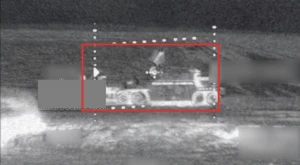
Revolution of Dignity: 10th anniversary of shootings in Kyiv
February 20, 2014, marked the bloodiest day in the history of the Ukrainian struggle during the Revolution of Dignity. Dozens of protesters lost their lives, succumbing to gunshot wounds
It has been 10 years since the shootings of protesters on Instytutska Street in Kyiv. What details have been revealed during this time and who has been punished for giving and executing criminal orders, read in the Espreso article.
February 2014 saw the bloodiest episode since the beginning of the Revolution of Dignity. Even though a ceasefire was declared, clashes between protesters and armed special forces continued in Kyiv on February 18-20. Buses with activists from different regions of Ukraine arrived in the capital to strengthen the ranks of the protesters. Berkut members tried to break through to Maidan. In the early morning, the participants of the Revolution of Dignity launched an offensive, trying to remove the security forces.
February 20 is known as the "bloody day" because 48 protesters who opposed Yanukovych's presidency were killed, as well as 4 law enforcement officers. More than 80 people were seriously injured.
History and background
Ukraine's Revolution of Dignity spanned from November 21, 2013, to February 22, 2014. It started with a peaceful protest on Kyiv's Independence Square, which later became known as Euromaidan. Citizens protested against the ruling regime of Viktor Yanukovych after he refused to sign an association agreement with the European Union, a choice that was supported by a large part of the Ukrainian population. Rallies began to take place in other parts of Ukraine as well. Ordinary people took to the streets with national flags and European symbols.
On November 30, the first violent dispersal of Euromaidan by Berkut special forces took place. As a result, about 94 people were injured. Most of them were students. This event became the starting point and the beginning of the Revolution of Dignity.
Protests escalated across the country, turning into mass actions. People demanded the resignation of the government and the president. From the beginning of December, according to various estimates, from half a million to one million protesters took to the streets of the capital.
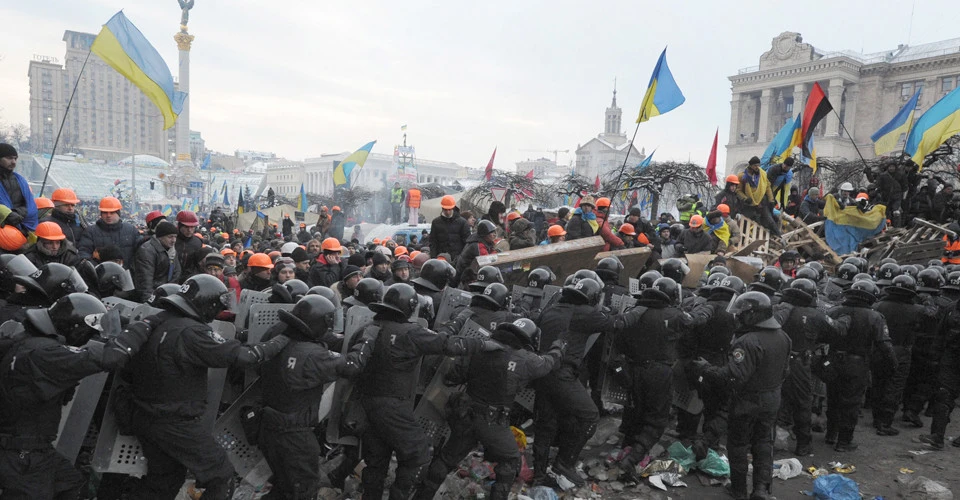
Photo: gettyimages
Shootings on Instytutska Street on February 20
On February 18, it was decided to hold a peaceful protest near the parliament building, calling on MPs to vote for a return to the 2004 Constitution.
In the morning, clashes broke out between Maidan protesters and security forces reinforced by Yanukovych supporters (who were possibly paid for their position) on the streets leading to the Verkhovna Rada building, including Instytutska and Mykhailo Hrushevskoho streets. Starting from 14:00, the first cases of deaths of protesters were recorded, and hundreds of people were injured.
The Ministry of Internal Affairs and the Security Service of Ukraine issued an ultimatum, demanding that people stop and threatening to launch an "anti-terrorist operation." The security forces eventually launched a large-scale assault on the barricades, using armored personnel carriers, water cannons, stun grenades, and firearms against the people. The Maidan protesters also felt the need to use firearms. During February 18-19, 28 Maidan protesters and 8 law enforcement officers were killed.
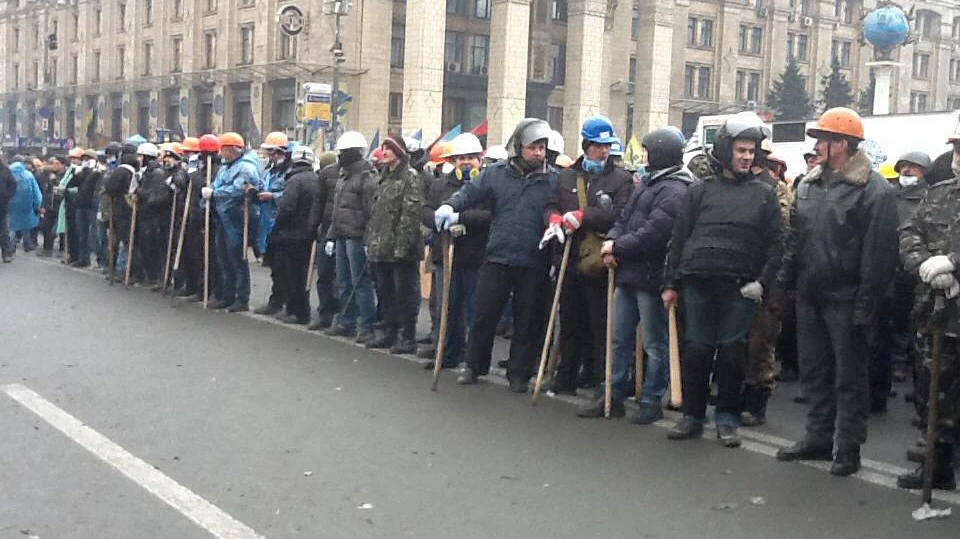
Photo: Andriana Stakhiv
The protests culminated in a tragic incident on Instytutska Street opposite the Khreshchatyk metro exit. Security forces opened massive fire on the demonstrators on February 20, 2014. This resulted in the deaths of 48 people and more than 80 people suffered gunshot wounds. Protests spread across most of Ukraine.
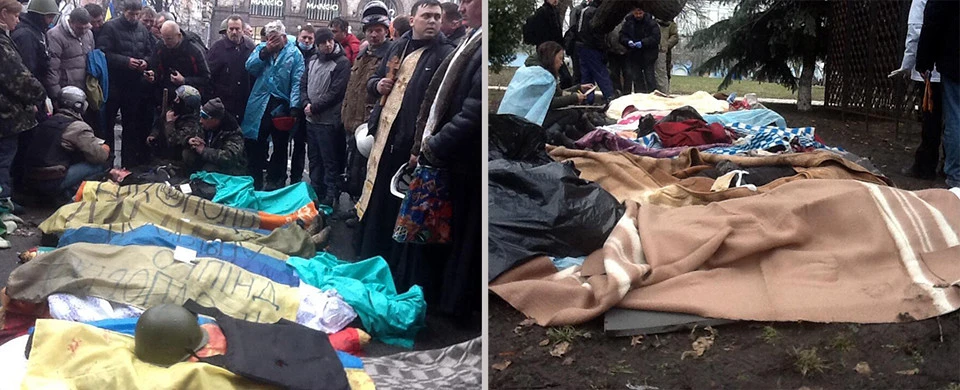
Photo: Andriana Stakhiv
Consequences of the shootings
Due to the bloody shootings, some security forces, particularly in the regions, announced their defection to the side of the protesters.
At 10:17 p.m., the Verkhovna Rada adopted a resolution "On Condemnation of the Use of Violence that Led to the Deaths of Civilians in Ukraine." This legal act recognized that the actions of the security forces were illegal. In the resolution, the parliamentarians called for an immediate cessation and prevention of further use of force, and a ban on the use of any type of weapon and special means against protesters. The resolution was voted in favor by 236 MPs, including 35 MPs from the Party of Regions and 35 non-factional MPs. Only the Communist Party faction did not give a single vote.
On February 21, the Verkhovna Rada (386 votes in favor) voted to restore the 2004 Constitution. In the evening, a crowded assembly was held on the Maidan to pay tribute to the dead. The mourners called the dead the "Heavenly Hundred".
As a result of the Revolution of Dignity, President Yanukovych was forced to flee the country. These events also led to the resumption of an active debate about the political future of Ukraine, its relations with Russia and the European Union, and became a symbol of the struggle for democracy and dignity.
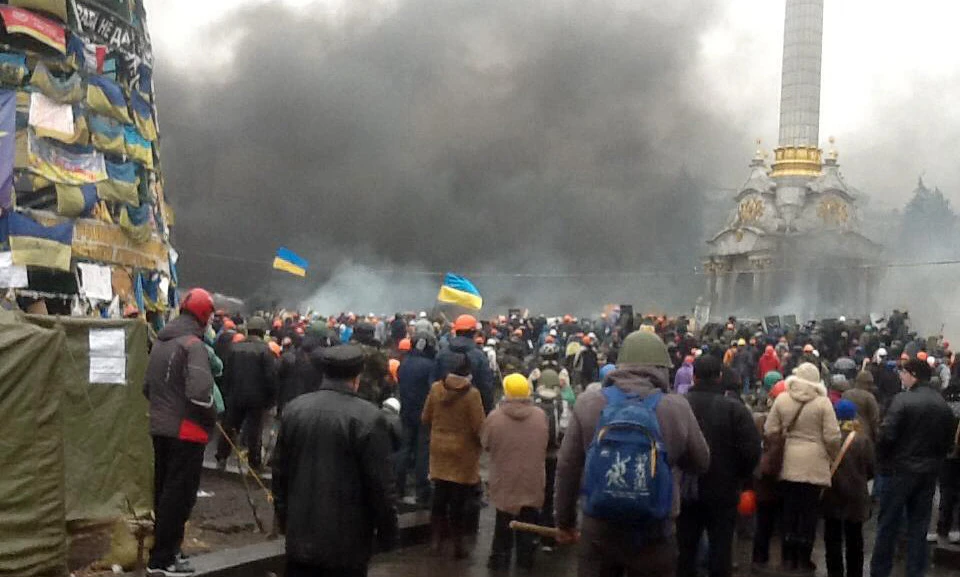
Heavenly Hundred Heroes
Since then, Ukraine has annually honored the memory of the Heavenly Hundred Heroes. Those who were the first to give their lives at the beginning of the modern Ukrainian struggle.
The events of February 20, 2014 were in fact the culmination of the Revolution of Dignity. Ukrainians paid a heavy price for their right to choose and move freely into the future. The deaths of the Heavenly Hundred Heroes changed the public consciousness of Ukrainians, actualizing the importance of such concepts as the right to self-determination, dignity, freedom, sovereignty of the state, democracy, and European choice.
Who was punished for the shootings of Maidan participants?
The investigating authorities that investigated the mass killings on February 18-20 concluded that the responsibility for the shooting of people on Maidan rested with a "criminal organization" of officials, including representatives of law enforcement agencies, whose leadership was under the control of former President Viktor Yanukovych. Members of the criminal group, including former high-ranking officials, are accused of committing these crimes, including:
- President of Ukraine Viktor Yanukovych;
- Minister of Internal Affairs of Ukraine Vitaliy Zakharchenko;
- Deputy Minister of Internal Affairs of Ukraine Viktor Ratushniak;
- Head of the Security Service of Ukraine Oleksandr Yakymenko;
- First Deputy Head of the Security Service of Ukraine, who headed the Anti-Terrorist Center, Volodymyr Totskyi;
- Minister of Defense of Ukraine Pavlo Lebedev;
- Chief of the Main Directorate - Commander of the Internal Troops of the Ministry of Internal Affairs of Ukraine Stanislav Shulyak;
- Acting Head of the Main Department of the Ministry of Internal Affairs of Ukraine in Kyiv Valeriy Mazan;
- Deputy Head of the Main Directorate of the Ministry of Internal Affairs of Ukraine, who was in charge of the public security police, Petro Fedchuk;
- Serhiy Kusiuk, commander of the Berkut special police unit at the Main Directorate of the Ministry of Internal Affairs of Ukraine in Kyiv.
As for those who carried out the criminal orders, the situation is also quite complicated. Proceedings are at different stages - some are still under investigation, others are being considered in courts, and some already have sentences that have entered into force or are being appealed.
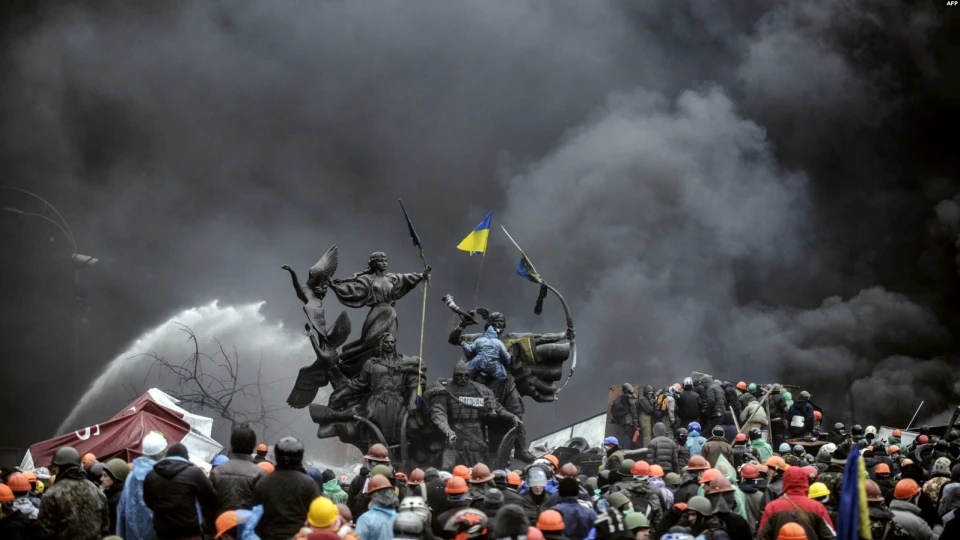
Photo: Radio Liberty
In October 2023, the Sviatoshynskyi District Court of Kyiv announced the sentences of Berkut officers who participated in the shootings on Instytutska Street on February 20, 2014. Thus, the deputy commander of the regiment, Oleh Yanishevskyi, was sentenced to life imprisonment, special forces officers Pavlo Abroskin and Serhii Zinchenko were sentenced to 15 years in prison, and Oleksandr Marynchenko was sentenced to 5 years in prison. Many of the defendants are outside the country and will be tried in absentia. In addition, many proceedings are currently in court or at the pre-trial investigation stage.
The Office of the Prosecutor General reported that as of today, seven cases related to the shootings have been closed due to the expiration of the statute of limitations, and 4 more cases are being considered by the court. "As of today, 7 cases have been closed due to the statute of limitations, and 4 cases are still being considered by the court. In other cases, no such petitions have been filed. The fact is that many of those prosecuted in the cases we are considering are law enforcement officers. And closing the cases on non-rehabilitating grounds will not allow them to continue to serve in law enforcement agencies," said Oleksiy Donskiy, head of the Maidan Department of the Prosecutor General's Office.
- News













